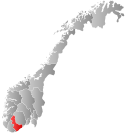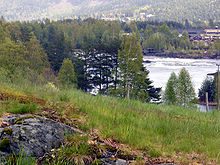Hornnes
Hornnes Municipality
Hornnes herred | |
|---|---|
 View of the local church, Hornnes Church | |
 Aust-Agder within Norway | |
 Hornnes within Aust-Agder | |
| Coordinates: 58°33′16″N 07°46′23″E / 58.55444°N 7.77306°E | |
| Country | Norway |
| County | Aust-Agder |
| District | Setesdal |
| Established | 1 Jan 1886 |
| • Preceded by | Hornnes og Iveland Municipality |
| Disestablished | 1 Jan 1960 |
| • Succeeded by | Evje og Hornnes Municipality |
| Administrative centre | Hornnes |
| Area (upon dissolution) | |
• Total | 378 km2 (146 sq mi) |
| Population (1960) | |
• Total | 1,280 |
| • Density | 3.4/km2 (8.8/sq mi) |
| Demonym | Horndøl[1] |
| Time zone | UTC+01:00 (CET) |
| • Summer (DST) | UTC+02:00 (CEST) |
| ISO 3166 code | NO-0936[2] |
Hornnes is a former municipality in the old Aust-Agder county in Norway. Hornnes was located in what is now the present-day municipality of Evje og Hornnes in the traditional district of Setesdal in Agder county. The 378-square-kilometre (146 sq mi) municipality of Hornnes existed from 1886 until 1960. The administrative centre was the village of Hornnes where the Hornnes Church is located.[3]
History
[edit]

The municipality of Hornnes was created on 1 January 1886 when the old municipality of Hornnes og Iveland was divided into two separate municipalities: Hornnes (population: 1,113) and Iveland (population: 1,103). During the 1960s, there were many municipal mergers across Norway due to the work of the Schei Committee. On 1 January 1960, Hornnes was merged with the neighboring municipality of Evje to form a new municipality called Evje og Hornnes (literally "Evje and Hornnes"). Prior to the merger Hornnes had a population of 1,280.[4]
Name
[edit]The municipality (originally the parish) is named after the old Hornnes farm (Old Norse: Hornnes) since the first Hornnes Church was built there. The first element is horn which means "horn". The last element is nes which means "headland". So the meaning of Hornnes is "the headland shaped like a horn". This is likely referring to the two horn-shaped peninsulas that jut out into the river Otra at the entrance to the lake Breidflå. Historically, the name was spelled Hordnæs.[5]
Government
[edit]While it existed, this municipality was responsible for primary education (through 10th grade), outpatient health services, senior citizen services, unemployment, social services, zoning, economic development, and municipal roads. During its existence, this municipality was governed by a municipal council of directly elected representatives. The mayor was indirectly elected by a vote of the municipal council.[6]
Municipal council
[edit]The municipal council (Herredsstyre) of Hornnes was made up of 21 representatives that were elected to four year terms. The tables below show the historical composition of the council by political party.
| Party name (in Norwegian) | Number of representatives | |
|---|---|---|
| Labour Party (Arbeiderpartiet) | 10 | |
| Farmers' Party (Bondepartiet) | 5 | |
| Liberal Party (Venstre) | 6 | |
| Total number of members: | 21 | |
| Party name (in Norwegian) | Number of representatives | |
|---|---|---|
| Labour Party (Arbeiderpartiet) | 9 | |
| Farmers' Party (Bondepartiet) | 5 | |
| Liberal Party (Venstre) | 6 | |
| Total number of members: | 20 | |
| Party name (in Norwegian) | Number of representatives | |
|---|---|---|
| Labour Party (Arbeiderpartiet) | 8 | |
| Communist Party (Kommunistiske Parti) | 1 | |
| Joint List(s) of Non-Socialist Parties (Borgerlige Felleslister) | 11 | |
| Total number of members: | 20 | |
| Party name (in Norwegian) | Number of representatives | |
|---|---|---|
| Labour Party (Arbeiderpartiet) | 9 | |
| Communist Party (Kommunistiske Parti) | 2 | |
| Farmers' Party (Bondepartiet) | 4 | |
| Joint list of the Liberal Party (Venstre) and the Radical People's Party (Radikale Folkepartiet) | 5 | |
| Total number of members: | 20 | |
| Party name (in Norwegian) | Number of representatives | |
|---|---|---|
| Labour Party (Arbeiderpartiet) | 9 | |
| Farmers' Party (Bondepartiet) | 4 | |
| Liberal Party (Venstre) | 5 | |
| Joint List(s) of Non-Socialist Parties (Borgerlige Felleslister) | 2 | |
| Total number of members: | 20 | |
| Note: Due to the German occupation of Norway during World War II, no elections were held for new municipal councils until after the war ended in 1945. | ||
Mayors
[edit]The mayors (Norwegian: ordfører) of Hornnes:[12]
- 1886-1895: Ola Hanssen Uleberg
- 1895-1902: Olaf Kallhovd
- 1902-1907: Alf Ketilsaa
- 1907-1913: Olaf Kallhovd
- 1914-1916: Torgeir G. Abusdal
- 1917-1919: Arnt Larsen
- 1919-1934: Torgeir G. Abusdal
- 1934-1940: Axel Sigfred Leween
- 1945-1947: Gunnar Uleberg
- 1947-1959: Olav A. Fennefoss
Attractions
[edit]Hornnes Church
[edit]Hornnes Church is an octagonal building that was constructed in 1828. Historical records show that there was a church in Hornnes as far back as 1327. There are also records in Rome referring to "Ornes i Odralen" (Hornnes Church is part of the Otredal prosti).
Mining
[edit]Mining is prevalent throughout the region, and Hornnes is home to the Hornnes Mineralparken. Visitors can tour a mine and learn about the minerals such as quartz and feldspar that are mined there.
Notable people
[edit]- Hartvig Caspar Christie (1893-1959), a Norwegian politician
- Torleiv Hannaas (1874-1929), a Norwegian philologist who was chairman of Noregs Mållag
- Geir Kjetsaa (1937-2008), a professor
See also
[edit]References
[edit]- ^ "Navn på steder og personer: Innbyggjarnamn" (in Norwegian). Språkrådet.
- ^ Bolstad, Erik; Thorsnæs, Geir, eds. (26 January 2023). "Kommunenummer". Store norske leksikon (in Norwegian). Kunnskapsforlaget.
- ^ Thorsnæs, Geir, ed. (10 July 2015). "Hornnes". Store norske leksikon (in Norwegian). Kunnskapsforlaget. Retrieved 22 May 2017.
- ^ Jukvam, Dag (1999). Historisk oversikt over endringer i kommune- og fylkesinndelingen (PDF) (in Norwegian). Statistisk sentralbyrå. ISBN 9788253746845.
- ^ Rygh, Oluf (1905). Norske gaardnavne: Nedenes amt (in Norwegian) (8 ed.). Kristiania, Norge: W. C. Fabritius & sønners bogtrikkeri. p. 186.
- ^ Hansen, Tore; Vabo, Signy Irene, eds. (20 September 2022). "kommunestyre". Store norske leksikon (in Norwegian). Kunnskapsforlaget. Retrieved 1 January 2023.
- ^ "Kommunevalgene og Ordførervalgene 1955" (PDF) (in Norwegian). Oslo: Statistisk sentralbyrå. 1957. Retrieved 21 December 2020.
- ^ "Kommunevalgene og Ordførervalgene 1951" (PDF) (in Norwegian). Oslo: Statistisk sentralbyrå. 1952. Retrieved 21 December 2020.
- ^ "Kommunevalgene og Ordførervalgene 1947" (PDF) (in Norwegian). Oslo: Statistisk sentralbyrå. 1948. Retrieved 21 December 2020.
- ^ "Kommunevalgene og Ordførervalgene 1945" (PDF) (in Norwegian). Oslo: Statistisk sentralbyrå. 1947. Retrieved 21 December 2020.
- ^ "Kommunevalgene og Ordførervalgene 1937" (PDF) (in Norwegian). Oslo: Statistisk sentralbyrå. 1938. Retrieved 21 December 2020.
- ^ Uleberg, Olav O.; Kleveland, Olav Arne (2003). Kultursoge for Evje og Hornnes (in Norwegian). Vol. II. Evje og Hornnes Sogelag. pp. 380, 388–389, 391–392, 401–404, 418–420, 430–431, 441, 452, and 463.
External links
[edit] Aust-Agder travel guide from Wikivoyage
Aust-Agder travel guide from Wikivoyage

